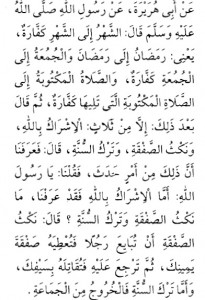Three people will not have their good deeds serve as an expiation
The Messenger of Allah sallalahu `alayhi wa sallam said : The month of Ramadan is an expiation (for a Muslim) for the (minor) sins until the next Ramadan and likewise one Jumu`ah prayer to the next is an expiation for the sins in between and Fardh prayer is an expiation for the sins until the next fardh prayer. Then he `alayhi salatu was-salaam said “Except for three (muslims)”.
Muslim #1: Who associates partners with Allah
Then the Messenger of Allah mentioned the other two and the king of Arabic language (sahaaba) understood the arabic wording but didn’t understand how these Arabic words implied or meant for the remaining two traits i.e. Nakthus-safqati and Tarkus-sunnah , so the prophet clarified saying :
Muslim #2: That you first pledge allegiance to someone (a ruler) by placing your right hand in his hand and later break the pledge and go and fight him with the sword
Muslim #3 : Tarkus-sunnati meant he who separated from the Muslims jam`ah (main majority)
[Ref: Musnad Ahmad 2/229; Hasan]
Some Important lessons :
- Contrary to what many apostate Munkirul Hadeeth folks think , the fact is that knowing Arabic in itself is not enough to understand religious rulings and implications.
- Separating oneself from the Muslim majority is such a disgusting act that the Prophet not only labelled it as “ abandoning my example” but also said the aforementioned three major good deeds will not serve an expiation for him. Then what about those who abandon the path of the majority of Muslims and resort to invented 20th century ideologies such as Javed Ghamidi, or other fully and partial hadeeth rejecters like him?
- This hadeeth (its first part) is also a proof that Muslims can commit shirk even after accepting Islam.
